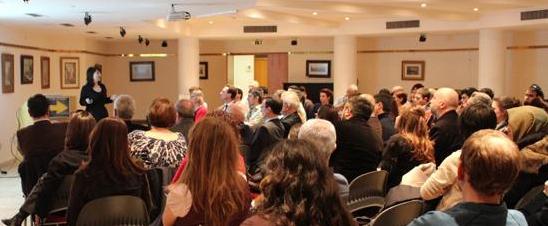Dean Önkal Points the Way to Future Management
On Wednesday last week, Prof. Dilek Önkal, dean of the Faculty of Administrative, Economics and Social Sciences and professor in the Faculty of Business Administration, delivered the first of this semester's Library Lunchtime Lectures, entitled "Future Management."
Speaking to a packed audience of Bilkent students and instructors, Prof. Önkal described the nature of "futures research" and how businesses and other institutions translate this research into decision making. Prof. Önkal's own research in these fields has resulted in numerous seminal papers in top journals and important collaborations with leading academics outside Turkey. She outlined clearly how "worrying about the future" -- that is, uncertainty and risk -- can be replaced by "managing the future."
Specifically, judgmental forecasting is one of the main tools by which predicting the future can be organized and managed: preferred by many to quantitative techniques, judgmental forecasting takes the forecaster's intuition, experience and informational asymmetries into consideration, and allows for an element of flexibility and adjustment in predictions not possible with mere statistical approaches. Prof. Önkal then pointed to some of the problems or "traps," mostly human in nature, inherent in forecasting, and also discussed the impact on forecasting by different personality types and by groups as opposed to individuals. Scenarios, or stories, were shown to be the most effective way of representing forecasts.
Prof. Önkal concluded her talk by describing some existing work on future forecasts in general. The Millennium Project, for example, lists 15 "global challenges" facing humanity, and other researchers have also predicted important trends for various aspects of our lives in the coming 50 years. For example, possible extinctions by 2050 include house keys, gasoline-powered vehicles and Google; while predicted innovations that we can look forward to include mindwipes and artificial brains! The lecture was followed by a lively question and answer session involving members of the audience.
